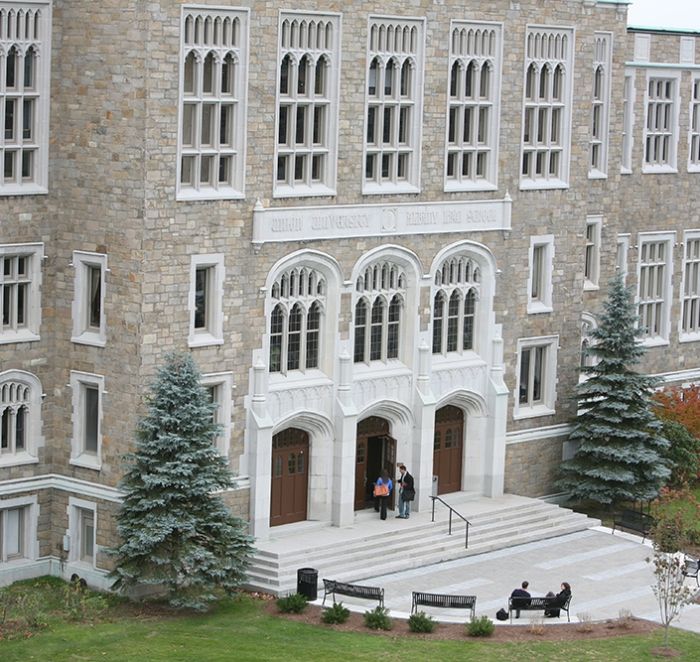SUNY NanoCollege and Albany Law Create First-of-its-Kind Program for NanoTech Education
Albany Law School announced a partnership with the SUNY College of Nanoscale Science and Engineering (CNSE) that will allow students to work with startup companies, help develop products from idea to commercialization, work in a Tech Transfer Practicum, and extern at the CNSE Office of Technology Innovation and Commercialization. The partnership is considered the first of its kind in the country.
See the full announcement below.
SUNY NANOCOLLEGE AND ALBANY LAW SCHOOL PARTNER TO CREATE FIRST-OF-ITS-KIND NANOTECHNOLOGY EDUCATION AND TRAINING PROGRAM
‘Ecosystem for Nanotechnology, Entrepreneurship and Law’ (eNTEL) will provide unmatched student experience as launch pad for development of startup companies and attraction of business investment
Albany, N.Y. – In support of Governor Andrew Cuomo’s nanotechnology-based education and economic development strategy, the SUNY College of Nanoscale Science and Engineering (CNSE) and Albany Law School (Albany Law) today announced the launch of a joint educational program, “Ecosystem for Nanotechnology, Entrepreneurship and Law” (eNTEL), which will integrate the strengths of each institution to uniquely prepare student entrepreneurs to launch startup companies and attract business investment as a means of further driving New York’s fast-growing innovation economy.
“We look forward to this collaboration and to playing a defining role as New York leads the world in 21st century entrepreneurial opportunities.”
“This partnership is a testament to Governor Andrew Cuomo’s visionary blueprint for economic growth, including the groundbreaking ‘Start-up NY’ initiative, which is laying the foundation for New York to expand its global leadership in nanotechnology research, development, commercialization and manufacturing,” said Dr. Pradeep Haldar, CNSE Vice President of Entrepreneurship Innovation and Clean Energy Programs and Head of CNSE’s Nanoeconomics Constellation. “We are excited to embark on this partnership with the prestigious Albany Law School to create a one-of-a-kind program that will further enhance New York’s ecosystem for nanotechnology-based entrepreneurship and set the stage for retaining top talent and attracting business and investment growth that will benefit our region and state.”
“Albany Law School is excited to partner with the globally recognized SUNY College of Nanoscale Science and Engineering to create the cutting-edge eNTEL program, which will draw business investment and the resultant jobs to the region, and attract and retain top-tier students who are interested in the exciting area at the intersection of law, science, technology, engineering, and entrepreneurship,” said Penelope Andrews, Albany Law School President and Dean. “We look forward to this collaboration and to playing a defining role as New York leads the world in 21st century entrepreneurial opportunities.”
Through the eNTEL program, both CNSE and Albany Law will foster a culture of interdisciplinary collaboration that will assemble the experience, knowledge, and expertise of each institution’s faculty and staff, as well as practitioners and experts in the Capital Region, to create training opportunities, joint classes and collaborative projects, all intersecting with technology, entrepreneurship, and the law, which will be issued jointly by CNSE and Albany Law.
“We look forward to this collaboration and to playing a defining role as New York leads the world in 21st century entrepreneurial opportunities.”
Students will work in teams to explore ways to develop products from idea to commercialization; create a “Tech Transfer Practicum” in which students from both CNSE and Albany Law will bring business ideas generated by CNSE student researchers to market; provide Albany Law students with vital real-world experience through placement in an externship with the CNSE Office of Technology Innovation and Commercialization; and, in collaboration with Albany Law’s Government Law Center, the school’s Tax and Transactions Clinic will provide free start-up legal assistance to selected very early stage businesses and nonprofit organizations, including those founded by CNSE students that have educationally appropriate legal needs. These initiatives will give students from both institutions opportunities to bring ideas to market and grow them into successful businesses to create economic development opportunities in the region, and to provide opportunities for area attorneys to service the businesses after the initial stage.
Portions of the program will be implemented over the next five years, with more than 200 students expected to be trained in the scientific, commercial, and legal aspects of nanoentrepreneurship, simultaneously strengthening the network of alumni, faculty, engineers, entrepreneurs, and practicing attorneys involved with the nanoscale industry in the Capital Region and throughout New York State. Additionally, the program aims to attract top engineering, business, and law students to the region to enhance enrollment at both institutions.
CNSE is a critical enabling resource in catalyzing new research, development, and business investments from the various sectors of the nanotechnology industry across New York State, fostering critical partnerships to produce and commercialize nanotechnology innovations, leading to economic development and job creation. Albany Law is America’s oldest independent school of law and is a nationally recognized center of learning and teaching as it provides opportunities to develop habits of critical analysis, understanding of theory, and the acquisition of professional skills. Through this agreement, each institution offers an affiliation with a distinguished cadre of faculty, researchers, students, experts, and leaders who are notable in their respective fields of study.
About CNSE. The SUNY College of Nanoscale Science and Engineering (CNSE) is the first college in the world dedicated to education, research, development, and deployment in the emerging disciplines of nanoscience, nanoengineering, nanobioscience, and nanoeconomics. With more than $17 billion in high-tech investments, CNSE represents the world’s most advanced university-driven research enterprise, offering students a one-of-a-kind academic experience and providing over 300 corporate partners with access to an unmatched ecosystem for leading-edge R&D and commercialization of nanoelectronics and nanotechnology innovations. CNSE’s footprint spans upstate New York, including its Albany NanoTech Complex, a 1.3 million-square-foot megaplex with the only fully-integrated, 300mm and 450mm wafer computer chip pilot prototyping and demonstration lines within 135,000 square feet of Class 1 capable cleanrooms. More than 3,100 scientists, researchers, engineers, students, and faculty work here, from companies including IBM, Intel, GlobalFoundries, SEMATECH, Samsung, TSMC, Applied Materials, Tokyo Electron, ASML, and Lam Research. CNSE’s latest expansion, which includes NanoFab Xtension (NFX), headquarters for the world’s first Global 450mm Consortium (G450C), and the Zero Energy Nanotechnology (ZEN) building, a living laboratory for green energy technologies, will add more than 1,000 scientists, researchers, and engineers from CNSE and global corporations. CNSE Kiernan Plaza in downtown Albany is home to CNSE's Smart Cities Technology Innovation Center (SCiTI). CNSE’s Solar Energy Development Center in Halfmoon, which provides a prototyping and demonstration line for next-generation CIGS thin-film solar cells, and the CNSE Photovoltaic Manufacturing and Technology Development Facility (CNSE MDF) in Rochester, the solar industry’s first full-service collaborative facility dedicated to crystalline silicon, support CNSE’s leadership of the U.S. Photovoltaic Manufacturing Consortium (PVMC). CNSE’s Smart System Technology and Commercialization Center of Excellence (STC) in Rochester offers state-of-the-art capabilities for MEMS fabrication and packaging. CNSE also co-founded and manages operations for the Computer Chip Commercialization Center (Quad-C) at SUNYIT and is lead developer of the Marcy Nanocenter site as part of the ‘Nano Utica’ initiative, and is partnering with AMRI and the Buffalo Niagara Medical Campus to develop the Medical Innovation and Commercialization Hub in Buffalo. For information, visit https://sunypoly.edu/.





